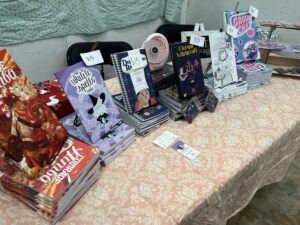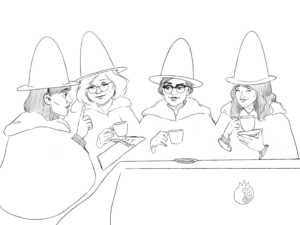It may not feel like it, but The Princess Bride is officially over thirty years old this year. Yet, with such a fervent fanbase behind it, there seem to be no signs of its fading from pop culture memory. Upon my first viewing, I knew The Princess Bride was everything my elementary school self wanted from a movie. Adventure, humor, memorable characters, and above all, a love story. As Robin Wright and Cary Elwes embraced through the VHS fuzziness of my TV, I couldn’t help but sigh and think “Now this is the epitome of romance.”
When I revisit it now, older and (hopefully) a little wiser, it’s still super fun and romantic in a lot of ways other movies from my childhood/adolescence simply aren’t (I’m looking at you, Twilight). While it’s no perfect movie either, I ultimately believe that the secret to this singular, enduring love story is in the details.

This is so romantic you’d think it would be nearly unbearable, but you’d be wrong
If you haven’t seen the movie, allow me to explain. The film tells the love story of Buttercup and Westley, who are part of a storybook being read to a young Fred Savage by his grandfather. Because of this framing device, there’s a little more room for self-reflexivity and awareness than in your typical fairy tale love story, and that awareness helps the audience buy into the romance of it all. Even if we come in at the beginning on Fred Savage’s side (“Is this a kissing book?”) by the end of it, we’ve completely bought into the love story! Because when the story can acknowledge and even embrace its cliched nature, it’s going to feel genuine enough for the audience to really lean in and get swept away. As we go on this journey with Savage, we realize that while there’s always the potential for cynicism, there’s the potential for true optimism as well.
The back-and-forth of this narrative frame sets a winking, irreverent tone for the film that makes multiple rewatches not only doable but super enjoyable! When a story takes itself too seriously, it can get stale. So, considering that this film constantly shirks self-importance, it’s no surprise that The Princess Bride has managed to remain so fresh over the years.

This movie is still so fresh, also because of its optimistic approach towards romance. While it’s true that the “love conquers all” narrative can be a bit naive and unrealistic, it’s genuinely comforting to see such a pure concept played out in a fun way. Even though our two lovers encounter some heavy obstacles along the way to their happy ending (years spent away at sea, torture chambers, Rodents Of Unusual Sizes, etc), they persevere.
The faith Buttercup and Westley have in each other is something that constantly amazes me with each viewing. It’s a nice reminder that maybe love and trust can be as simple in our everyday lives as it is for them. “As you wish,” is just as much of a declaration of love as it is a declaration of putting your faith in someone. This kind of devotion is something that, especially now, everyone can find comfort in, whether they have a romantic significant other or not.
In addition to providing comfort, both the optimistic romance and the self-reflexive tone balance each other out. The self-awareness never feels cynical or hokey, and the romance never feels ingenuous or flat. Without each other to keep things balanced, it’s possible this movie would be far from the classic we know and love.

As the world seems to keep turning (and burning), staying focused on the good things around us can be difficult, or nearly impossible some days. Ultimately though, I believe that movies like The Princess Bride can help us remember what makes life worth living in the first place. You might think this is a cheesy take (and it kind of is), but it’s a cheesy take that I 100% believe. If we don’t have something good to hold onto — whether it’s a movie or book or whatever else — when everything else feels like it’s going to shit, what do we have?
While its witty one-liners and memorable sword-fighting sequences have been a big component in the long life of The Princess Bride, I believe that in the end, its optimistic heart and its spirit of love are really what has kept this one relevant. Through both its self-aware nature and its genuine appreciation of romance, there’s a powerful acknowledgment of the ways in which love can conquer all. Even if it’s cliche, it’s a lesson I’ll gladly hold onto, even as the world is burning.




